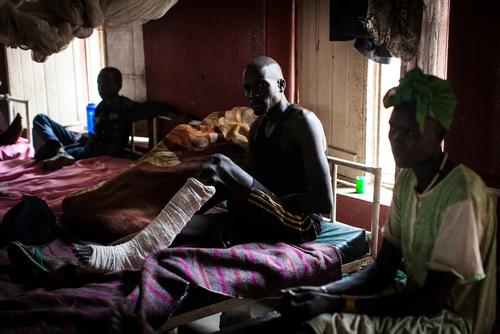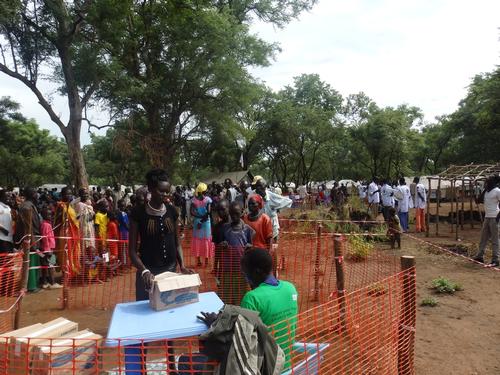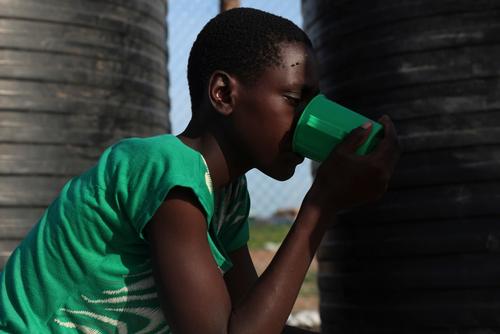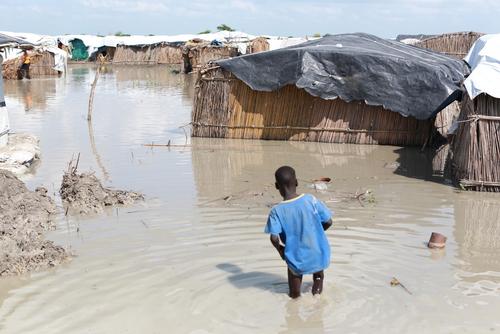After three months running the maternity ward at MSF’s hospital in Nasir, South Sudan, it was almost time for midwife Patricia van der Dennen to return home. But then fighting reached the town.
“I’ve seen everything in the past few days: a baby needing to be resuscitated, a woman bleeding after a miscarriage, another suffering life-threatening complications while giving birth. But for all of them, it turned out well in the end. Relieved, I tell myself, “Now I’ve seen everything; it can’t get any worse…"
'The fighting is getting closer'
Then comes the news: the fighting is getting closer. We have 15 minutes to collect our belongings from our huts and to meet by the boats. A key team, made up of a team leader, doctor, nurse and logistician, will stay behind to inform our South Sudanese staff and ensure that all the patients are discharged from the hospital. I pack my things in a daze, my heart is pounding… we're leaving.
As dusk falls, the boats start up their motors and we travel along the Sobat river. We pass village after village, each one quiet and dark, without electricity. We reach a village called Jigmir where another organisation runs a clinic and where we can stay.
Violent seizures
Two days later, the satellite phone rings. A woman has arrived at our hospital in Nasir and the remaining doctor and nurse ask me for advice. The woman is in labour and is having violent seizures. I ask for more information: how long has she been in labour, how long has she been having seizures, what is her blood pressure?
All the medical supplies and drugs in the hospital have been packed away. The blood pressure monitor is in one of the storage boxes and has to be searched for. I suspect a severe form of preeclampsia, which can be life-threatening for mother and child. I recommend administering magnesium sulphate. The correct dose is in the protocol – do they have it? They also suspect blood poisoning and expect the patient to suffer respiratory arrest within a few minutes. They have no ventilator at hand, that too is packed away.
Nothing but silence
What to do? The surgeon and I are here; the patient is in Nasir. We have little time. We decide to go back to Nasir and set off in the boat, this time in daylight.
Boats pass us in the opposite direction, overfilled with people and household items. After an hour’s journey in the glaring sun, we dock the boat. The nurse comes to meet me as I make my way to the hospital. The woman has given birth; both mother and baby are alive. I’ve never seen the hospital grounds so empty. No patients, no staff, no sheep. There is nothing but silence.
Medical supplies scattered about
The delivery room is dark, with medical supplies scattered about. The doctor looks tired and wants me to take over. I put on gloves to examine the patient. She’s still in a daze, but her condition seems to have stabilised. I give her a sponge bath and make a mental note of what to do next: the baby needs antibiotics; the mother needs medication to prevent possible infection and the risk of further seizures; I need to take her heart rate and blood pressure. Just as I prepare an IV line and some magnesium sulphate, the woman suffers another seizure. It’s so violent that for a while I can’t insert the drip and administer the drugs.
This woman should be in an intensive care unit but she’s here, in an empty hospital in Nasir. I need to get on with hooking the baby up to an IV line and giving him antibiotics. There’s still so much to do.
Leaving the hospital immediately
Just as I calculate the correct dose of medicine for the baby and am administering it, a member of our South Sudanese team arrives and says to me, “Patricia, you must go! The frontline is approaching!" My radio crackles with a message from the team leader: I must leave the hospital immediately, the situation in Nasir is too insecure for us to stay. We must evacuate again, but this time we will take the patient with us.
We rush to collect everything we need and pile it up in the back of our pick-up truck. On the boat, the patient lies on a stretcher, with two IV drips attached: one with medication to prevent the seizures, the other with glucose, as she hasn’t eaten for some time. With a heavy heart, I realise that our South Sudanese staff will not be coming with us. They’ll remain in this turmoil. What will happen to them and their families?
Fleeing on foot
Shocked, I step onto the boat and sit down next to the patient. Her mother is there too, tightly holding the newborn baby, wrapped up in layers of blankets, and accompanied by a boy of ten and a girl of two. As well as the overcrowded boats on the river, many people are fleeing on foot. A trail of people moves along the shoreline, carrying the entire contents of their homes, children with a bucket or a few pots and pans on their heads.
We reach Jigmir safely and get the patient comfortable for the night in the local clinic. Throughout the night we carry out checks on mother and baby every three hours and give the baby glucose before returning to our beds under a piece of plastic sheeting stretched over some bamboo. The baby is doing well and the mother’s blood pressure is under control.
No more seizures
The next morning, I help the mother with breastfeeding. The baby latches on and drinks as if his life depends on it. I’m relieved that the woman is doing so well after the trip and a night in the clinic. She’s not had any more seizures since the previous afternoon, which is a very good sign.
I look at the newborn baby and think, "Life can be so unfair, you’re only a few hours old, but you’re fleeing violence already."
MSF evacuated its hospital in Nasir in May 2014 after approaching heavy fighting led to the entire population of the town fleeing the area. The MSF hospital was the only secondary healthcare facility for nearly 300,000 people in the region.
When MSF staff visited Nasir towards the end of June 2014, they found that the hospital had been completely looted and people had deserted the town. It remains extremely challenging to reach the population and MSF is very concerned about the health status of those who have fled.
From January to April 2014, staff at Nasir hospital provided an average of 4,100 outpatient consultations each month, 1,400 of them for children under five. Approximately 405 patients each month were hospitalised: around 150 in the inpatient ward; 95 women in the maternity ward; 50 children in the intensive therapeutic feeding ward; and 140 patients in the surgical ward.






